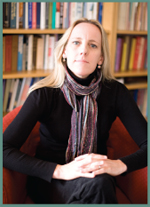A Watershed Moment for Death with Dignity

MOST OF US don’t choose the time of our death and don’t have any idea when we’ll die. And that’s a good thing. Living life to the fullest and helping others do so is the humanist’s primary focus. But when suffering becomes unbearable and treatment to alleviate that suffering fails or doesn’t exist, it seems the humanist philosophy must support an individual’s right to choose to end his or her life.
Certainly there are scenarios in which humanists will disagree that death is optimal, but humanists have long been on the forefront of what is now commonly called the death-with-dignity movement, explored herein by Tone Stockenström. She attended the World Federation of Right to Die Societies twentieth biennial meeting in Chicago several weeks before the story of Brittany Maynard broke. As you likely know, Maynard was the terminally ill young woman who made headlines this fall when she announced that she would legally end her life under Oregon’s Death with Dignity Act, and went public to advocate for similar laws nationwide.
In their satire mirroring religious condemnations of Maynard’s decision, the folks at The Onion (who will be honored at the AHA’s annual conference in Denver this year) opined, “It doesn’t matter how sick you are. You don’t get to die until God messes with you for a while first,” likening the Christian creator to a cat who toys with its prey until the torture gets old. It’s a harsh analogy but makes an important point about the zealots’ imposition and utter lack of compassion. Making decisions about death with your loved ones and your doctor is hard enough. We should allow people to follow their conscience and make such decisions according to their own belief systems.
The night before my father died I knew it was coming. But that’s only because he’d been in a coma following a bicycling accident, and my mother, siblings, and I had made the decision to take him off life support after eight weeks. The night before, January 18, 2007, I left my office at the Humanist in DC and headed for the metro, ducking into a tapas bar on U Street to gather my thoughts. It seemed unnatural but in no way did it seem wrong or unethical to be contemplating the end of my father’s life. I can only imagine how much harder it would’ve been if he’d been conscious and suffering. This is the state so many elderly and terminally ill people on the planet find themselves in, and humanists must continue to champion the right to die as a human rights issue.
Of course, I can’t think about human rights at this moment without Michael Brown, Eric Garner, and the Senate Intelligence Committee’s scathing report on the CIA’s post-9/11 torture program exploding into view. Released on the eve of Human Rights Day, the gross revelations in the torture report really make me wonder if the good life (to say nothing of a good death) can ever be had by all. Back in 2009 we examined the United States’ use of harsh interrogation techniques, pointing out that they violated the Geneva Conventions and other treaties but were justified on shaky legal grounds and equally shaky claims of effectiveness. “Has torture become sacred?” we asked. Five years later, with the CIA’s actions exposed, the answer is no.
If nothing else, let’s hope the knowledge that our government so heinously violated the human rights of others—some guilty of nothing more than a familial relationship with a person of interest—brings a reckoning and ensures we do everything we can to prevent it from happening again. New year, new collective conscience. How’s that for a resolution?
